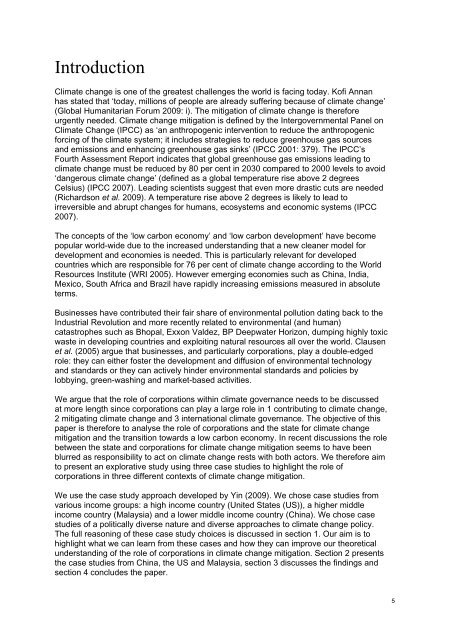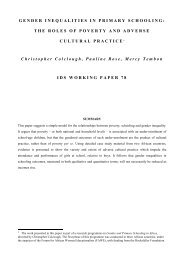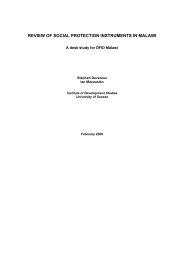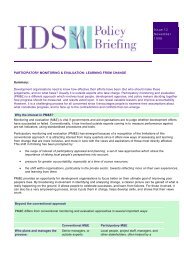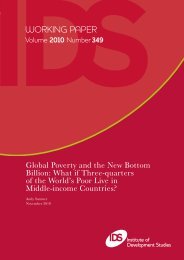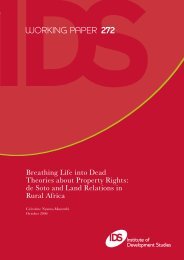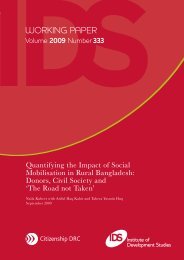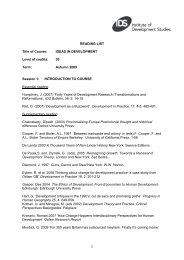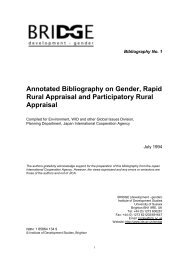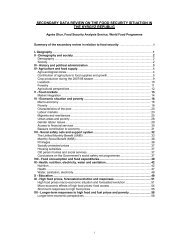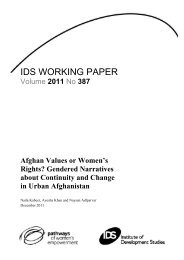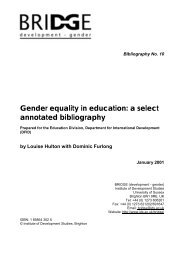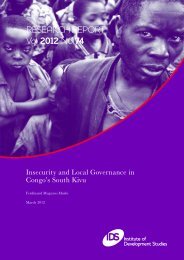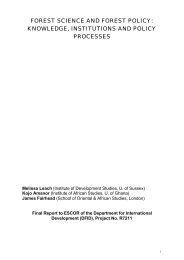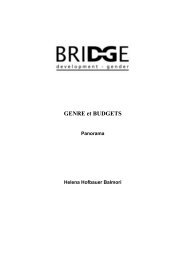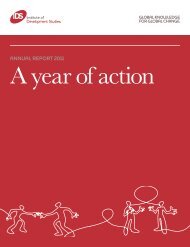IDS WORKING PAPER - Institute of Development Studies
IDS WORKING PAPER - Institute of Development Studies
IDS WORKING PAPER - Institute of Development Studies
Create successful ePaper yourself
Turn your PDF publications into a flip-book with our unique Google optimized e-Paper software.
Introduction<br />
Climate change is one <strong>of</strong> the greatest challenges the world is facing today. K<strong>of</strong>i Annan<br />
has stated that ‘today, millions <strong>of</strong> people are already suffering because <strong>of</strong> climate change’<br />
(Global Humanitarian Forum 2009: i). The mitigation <strong>of</strong> climate change is therefore<br />
urgently needed. Climate change mitigation is defined by the Intergovernmental Panel on<br />
Climate Change (IPCC) as ‘an anthropogenic intervention to reduce the anthropogenic<br />
forcing <strong>of</strong> the climate system; it includes strategies to reduce greenhouse gas sources<br />
and emissions and enhancing greenhouse gas sinks’ (IPCC 2001: 379). The IPCC’s<br />
Fourth Assessment Report indicates that global greenhouse gas emissions leading to<br />
climate change must be reduced by 80 per cent in 2030 compared to 2000 levels to avoid<br />
‘dangerous climate change’ (defined as a global temperature rise above 2 degrees<br />
Celsius) (IPCC 2007). Leading scientists suggest that even more drastic cuts are needed<br />
(Richardson et al. 2009). A temperature rise above 2 degrees is likely to lead to<br />
irreversible and abrupt changes for humans, ecosystems and economic systems (IPCC<br />
2007).<br />
The concepts <strong>of</strong> the ‘low carbon economy’ and ‘low carbon development’ have become<br />
popular world-wide due to the increased understanding that a new cleaner model for<br />
development and economies is needed. This is particularly relevant for developed<br />
countries which are responsible for 76 per cent <strong>of</strong> climate change according to the World<br />
Resources <strong>Institute</strong> (WRI 2005). However emerging economies such as China, India,<br />
Mexico, South Africa and Brazil have rapidly increasing emissions measured in absolute<br />
terms.<br />
Businesses have contributed their fair share <strong>of</strong> environmental pollution dating back to the<br />
Industrial Revolution and more recently related to environmental (and human)<br />
catastrophes such as Bhopal, Exxon Valdez, BP Deepwater Horizon, dumping highly toxic<br />
waste in developing countries and exploiting natural resources all over the world. Clausen<br />
et al. (2005) argue that businesses, and particularly corporations, play a double-edged<br />
role: they can either foster the development and diffusion <strong>of</strong> environmental technology<br />
and standards or they can actively hinder environmental standards and policies by<br />
lobbying, green-washing and market-based activities.<br />
We argue that the role <strong>of</strong> corporations within climate governance needs to be discussed<br />
at more length since corporations can play a large role in 1 contributing to climate change,<br />
2 mitigating climate change and 3 international climate governance. The objective <strong>of</strong> this<br />
paper is therefore to analyse the role <strong>of</strong> corporations and the state for climate change<br />
mitigation and the transition towards a low carbon economy. In recent discussions the role<br />
between the state and corporations for climate change mitigation seems to have been<br />
blurred as responsibility to act on climate change rests with both actors. We therefore aim<br />
to present an explorative study using three case studies to highlight the role <strong>of</strong><br />
corporations in three different contexts <strong>of</strong> climate change mitigation.<br />
We use the case study approach developed by Yin (2009). We chose case studies from<br />
various income groups: a high income country (United States (US)), a higher middle<br />
income country (Malaysia) and a lower middle income country (China). We chose case<br />
studies <strong>of</strong> a politically diverse nature and diverse approaches to climate change policy.<br />
The full reasoning <strong>of</strong> these case study choices is discussed in section 1. Our aim is to<br />
highlight what we can learn from these cases and how they can improve our theoretical<br />
understanding <strong>of</strong> the role <strong>of</strong> corporations in climate change mitigation. Section 2 presents<br />
the case studies from China, the US and Malaysia, section 3 discusses the findings and<br />
section 4 concludes the paper.<br />
5


